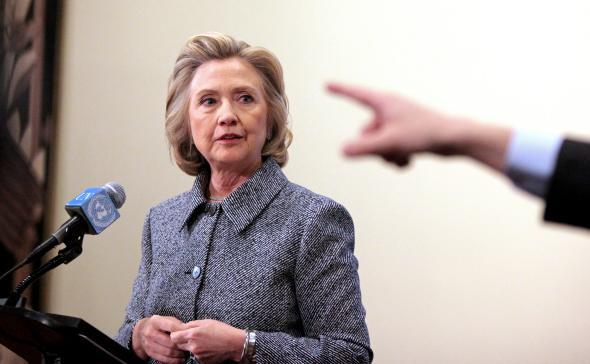In the two months since Hillary Clinton officially launched her presidential campaign, the overwhelming frontrunner for the Democratic nomination has moved left early and often. She’s made a forceful case to reform the criminal justice system, expand President Obama’s immigration overhaul, establish universal and automatic voter registration, and make same-sex marriage a constitutional right. Her leftward turn continued this past weekend with her call for a pay hike for low-wage workers, the latest sign that she’ll try to use economic equality as a populist calling card in 2016.
This is not how a Clinton campaign was expected to go. Without a serious challenger in the Democratic field, Clinton was generally thought to have little if any reason to run to the left—certainly not as fast and as far as she already has. But where progressives had feared that Hillary would cede ideological ground by employing the type of move-to-the-middle “triangulation” that her husband made famous, instead they’ve found a candidate who has been quick to publicly embrace one progressive cause of the moment after the next. The question, then, is what’s pushing Clinton so far left?
As I explained last week, it’s hard to imagine Clinton staking out the positions she has if she wasn’t convinced that’s where the Democratic voters already are. Sen. Elizabeth Warren and the pseudo-campaign that used her name didn’t necessarily move the base there, but they did make it a whole lot easier for Hillary and everyone else to see just where progressives stood and just how many of them there are. Bernie Sanders’s upstart campaign is providing the same service now that the left has finally woken up from their fever dreams of a President Warren. Still, as the Clinton camp conceded to the New York Times, Hillary’s leftward turn is less about short-circuiting an ideological battle in the Democratic primary and more about giving Clinton’s supporters something to get excited about about in the general election:
Mrs. Clinton’s aides say it is the only way to win in an era of heightened polarization, when a declining pool of voters is truly up for grabs. Her liberal policy positions, they say, will fire up Democrats, a less difficult task than trying to win over independents in more hostile territory—even though a broader strategy could help lift the party with her. …
Mrs. Clinton and her husband expressed concern last year when Democratic turnout fell precipitously. Recognizing that Democrats had to be galvanized to show up at the polls, Mrs. Clinton’s advisers used surveys and focus groups to assess the risks of running a strongly liberal campaign. They concluded that there were few.
Clinton’s team believes that her easiest path to the White House is the narrow one Obama traveled in 2012, not the wider road Bill Clinton took there back in 1992. She’s less concerned about expanding her party’s electoral advantage and more focused on simply cementing it. As David Plouffe, a top Obama adviser who’s consulted informally with Clinton, put it to the Times: “If you run a campaign trying to appeal to 60 to 70 percent of the electorate, you’re not going to run a very compelling campaign for the voters you need.” The calculated gamble to try to use the country’s polarization to her advantage could cause plenty of problems for Clinton if she wins the White House, but it’s clear that’s a problem she’d love to have. In the meantime, she’ll have to hope that she doesn’t alienate those same voters she’s abandoning to such a degree that they turn out to vote Republican.
Progressives have plenty of reasons to be skeptical of Clinton’s sincerity—particularly when it comes to her ties to Wall Street and her history of hawkishness—but it’s noteworthy that she believes she has a better chance of winning them over than she does of persuading moderate voters who are on the fence between the two parties. The irony, of course, is that liberals feared that Clinton’s political pragmatism would rob them of an ideological champion in 2016. Instead, it’s that very character trait that has her sounding more and more like one on the stump.
Previously in Slate:
